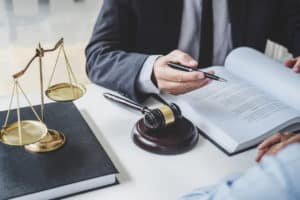
After an arrest, you may feel fear, disorientation, and anger. A consultation with a criminal defense lawyer is often the best way to cope with your feelings about your arrest and the charges filed against you.
An experienced lawyer will listen to your story without judgment. The lawyer will outline your legal options for dealing with your charges. Having an open and honest discussion with a lawyer will help you regain some control over the outcome of your case.
Here are some ways to prepare for a consultation with a criminal defense attorney in West Chester.
What Happens in a Consultation with a Criminal Defense Lawyer?

Criminal defense lawyers often offer free consultations for new clients. During this consultation, you and the lawyer get to know each other. You can use this time to interview lawyers about their experience and knowledge that may help with your case.
The consultation also allows the lawyer to understand your charges and begin to develop a defense for you. Most experienced lawyers have handled cases similar to your case. They can draw on those cases to help in their defense.
Before you go to your consultation, you can take a few steps to prepare, including:
Do Not Talk to Investigators
If the police are still investigating your case, do not talk to them before speaking to an attorney. Speaking to investigators without your lawyer can make your lawyer’s job much more difficult.
One trick the police use is to ask you in for questioning without arresting you. They only need to inform you of your right to remain silent during a custodial interrogation. If you are free to leave, they do not need to give you a Miranda warning. Instead, they will invite you in to ask you a few questions and use your answers to make a case against you.
The police academy trains officers in interrogation techniques. They have sophisticated ways of getting you to say things that will help them in their investigation. No matter what investigators tell you, they do not need your help “clearing things up.”
This applies whether you did anything or not. If the police interrogate you, they probably suspect you of something. Talking to them without a lawyer can lead to charges against you, even when you didn’t break any laws.
Do Not Talk About Your Case with Anyone Else
Police officers and prosecutors have many ways to get someone to testify. They can get testimony from significant others, siblings, and co-workers.
For this reason, you should avoid talking about your case with anyone before you talk to a lawyer. Talking with your cellmate in the holding cell or your best friend after your release could expose you to misunderstandings about what you said and what they heard.
Until you speak to a lawyer, you should not discuss your case with anyone. And after you hire a lawyer, your lawyer will probably advise you to keep quiet about your case until it ends.
Bring Paperwork
When you get released from jail, you will probably get paperwork from the jail and court. This paperwork will include your next court date and will list the charges against you.
Although the lawyer can access this information online, you will save the lawyer time by bringing it to your consultation. This will allow you to make the most of your free consultation.
Your paperwork may also include any conditions for your release. For example, if your case involves domestic violence, you may have a protective order against you. One of the key roles of a lawyer is to provide advice and counsel. A lawyer can advise you so you do not violate any of your release conditions and land back in jail.
Understand Your Charges
Many people who have been arrested do not understand the charges against them. Getting arrested can be chaotic. You might not have heard anything the officers said to you as they cuffed you and stuffed you into a police cruiser. But understanding your exact charges will help you and your lawyer develop defenses.
Suppose that you got arrested after you got into a bar fight. It makes a big difference if you were arrested for disorderly conduct, assault, or aggravated assault. Each charge has different elements, defenses, and punishments.
Think About Exculpatory or Mitigating Evidence
Prosecutors must disclose the evidence against you so your lawyer can prepare a defense. But preparing a defense will involve more than poking holes in the prosecution’s case. You should think about whether you have any evidence that proves you did not commit the act or explains why you committed the act.
You may have a witness who places you away from the crime scene. A witness may have seen or heard the alleged victim make a false accusation against you. You might even have a cell phone video that shows you defending yourself or others.
All of this will help your lawyer defend you against the charges.
Make a List of Questions
The initial consultation helps you pick the right lawyer. But you need to prepare with questions about the issues important to you.
Some questions you might ask a criminal defense attorney include:
- What experience do you have with similar cases?
- What are the worst-case and best-case scenarios for my case?
- What defenses can I raise?
- How much do you charge?
- How long will my case take?
- How will you keep me updated about the status of my case?
You may also have questions that apply to your specific situation. For example, you may need to understand how your criminal charges affect your child custody arrangement.
Write down all these questions so you can get all the answers you need.
Choosing a Criminal Defense Lawyer
Choosing a lawyer is a very personal decision. You need someone you can work with. You also need someone who understands your situation and goals. Most importantly, you need someone who has the drive and creativity to push prosecutors so that you might reach your goals. If you arrive prepared, a consultation provides a perfect opportunity to find a lawyer who meets all those criteria. To schedule a free consultation with an experienced criminal defense lawyer, contact Dicindio Law, LLC.
